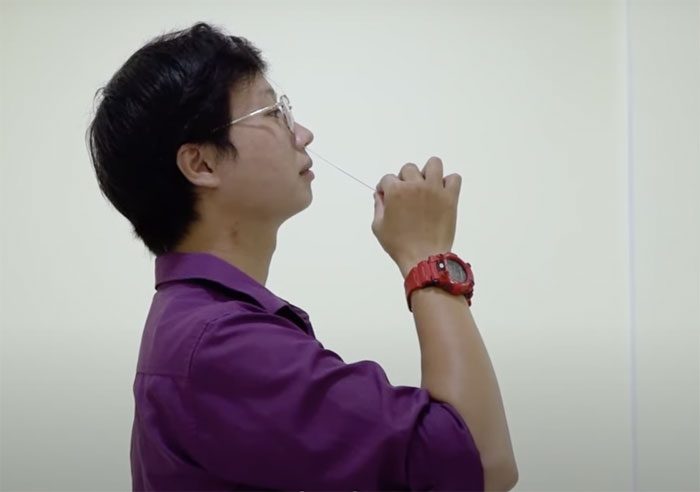The SARS-CoV-2 virus is evolving, mutating, and will coexist with humanity for a long time. To safely coexist with the virus, it is essential to be well-informed with scientific evidence and to take proactive steps. There are several preparations and habits you need to cultivate starting now.
Ways to Safely Coexist with Covid-19
- 1. Get vaccinated for Covid-19 as soon as it’s your turn
- 2. Always maintain a safe distance
- 3. Wear a mask as an essential item to prevent SARS-CoV-2 exposure
- 4. Cultivate the habit of washing hands at the right times and avoid touching your face
- 5. Develop a daily habit of gargling and nasal rinsing
- 6. Practice holding your breath when encountering strangers
- 7. Learn how to perform a rapid Covid-19 antigen test when necessary
- 8. Boost your immune system and keep your living space clean and ventilated
- 9. Provide complete health declarations as required
- 10. Manage underlying health conditions and learn self-care if you become a confirmed case
Media both domestically and internationally have frequently discussed future solutions: coexisting with the SARS-CoV-2 virus. Ultimately, history shows that epidemics come and go, but most viruses, including SARS-CoV-2, will remain, evolve, mutate, and coexist with humanity for the long term.
1. Get vaccinated for Covid-19 as soon as it’s your turn
The Covid-19 vaccine is currently the most strategic approach and preparation, effectively helping to reduce the risk of infection from the SARS-CoV-2 virus. If you have been vaccinated, even if you have only received the first dose, if you unfortunately become infected with SARS-CoV-2, the illness will likely be milder and less likely to worsen. All approved Covid-19 vaccines have shown effectiveness, so it’s essential to get vaccinated regardless of which vaccine is being rolled out by the government.

Get vaccinated for Covid-19 as soon as possible.
2. Always maintain a safe distance
Except for those living in the same household or close acquaintances who are considered safe according to guidelines, always keep an eye on your surroundings and maintain a safe distance from others. Of course, in the new normal, social and economic services have been designed to ensure safe distances, but you must always remember that maintaining distance is a fundamental long-term measure.
3. Wear a mask as an essential item to prevent SARS-CoV-2 exposure
While masks are not the optimal way to prevent infection, they clearly help reduce exposure to the SARS-CoV-2 virus through droplets or tiny saliva particles when talking, coughing, or sneezing. There are many types of masks available, so use those that have been recommended. Read the instructions carefully and apply them appropriately in all daily situations at work and in life.
4. Cultivate the habit of washing hands at the right times and avoid touching your face
This may sound easy, but if you review all the activities that occur in a day, you will find many moments when you forget to wash and sanitize your hands. Cultivating the habit of washing hands at the right times can effectively prevent exposure to the SARS-CoV-2 virus through contact with dirty surfaces. Creating the habit of limiting hand contact with your eyes, nose, and mouth helps avoid exposure to the SARS-CoV-2 virus.
5. Develop a daily habit of gargling and nasal rinsing
Pathogenically, the SARS-CoV-2 virus attaches itself to the mucous membranes of the nose and throat. Eliminating the virus from these areas is an effective way to prevent it from penetrating deep into the lungs and alveoli. Many health experts have provided videos on how to gargle and rinse the nose, so download and practice them now. Rinse your nose and throat 2-3 times a day as a habit, and also rinse after finishing work in crowded places, leaving healthcare facilities, or returning home.
6. Practice holding your breath when encountering strangers
Holding your breath for a long time is indeed difficult, but most people can hold their breath for 5-10 seconds. You should practice holding your breath as a conditioned reflex. For example, when you are outside, in a supermarket, restaurant, or workplace, it’s unavoidable to encounter others walking towards you or coming close unexpectedly. Clearly, in such situations, you cannot maintain the recommended distance, so the best way is to hold your breath and move quickly away to keep a safe distance. After some time of practice, holding your breath when a stranger comes close will become easier and gradually form a natural conditioned reflex.
7. Learn how to perform a rapid Covid-19 antigen test when necessary

Using a rapid test to detect SARS-CoV-2 antigens.
Once you accept coexisting with the virus, you should not be complacent about the risk of SARS-CoV-2 exposure. Stay vigilant by learning how to use rapid tests to detect SARS-CoV-2 antigens when you have doubts or are alerted. It’s best to use rapid Covid-19 antigen tests approved by the Ministry of Health. If the result is positive, you need to self-isolate, avoid contact with others, and immediately inform the authorities for timely action.
8. Boost your immune system and keep your living space clean and ventilated
There are many ways to enhance your immunity, which you can read about and implement through official resources. This includes eating a healthy diet, exercising for 30 minutes each day (such as walking, cycling, swimming), limiting alcohol consumption, managing your weight, getting enough sleep, managing stress effectively, and using approved herbal remedies to help detoxify and boost your immune system.
Cleaning your living space regularly is an important solution to eliminate potential virus hiding places.

Cleaning your home is an important solution to prevent disease.
9. Provide complete health declarations as required
Being well-informed about the epidemiological situation of Covid-19 in your area and providing complete health declarations will be very beneficial. Mastering information is the key to developing the most suitable solutions for coexisting with the SARS-CoV-2 virus. For example, knowing which areas are experiencing outbreaks will help you avoid them for safety.
10. Manage underlying health conditions and learn self-care if you become a confirmed case
As you age, it becomes harder to avoid underlying health conditions such as cardiovascular disease, diabetes, obesity, and kidney disease. Unfortunately, these are high-risk factors for Covid-19. To coexist with the virus in a controlled manner, it is essential to actively treat and manage any existing underlying conditions.
If you unfortunately become a confirmed case, remain calm and do not panic; health authorities will guide you on how to isolate yourself, whether in a centralized facility or at home, and how to proceed according to regulations. To be confident and cooperate effectively, you need to read, research, and thoroughly understand self-care guidelines at the facility or at home. The ultimate goal is to coexist safely with the SARS-CoV-2 virus.


















































